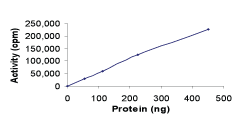
MST4, Active(M59-10G)
FOR BULK ORDER REQUESTS PLEASE CONTACT US
Description :Recombinant full-length human MST4 was expressed by baculovirus in Sf9 insect cells using an N-terminal GST tag.
Species :Human
Tag :GST tag
Expression System:Sf9 insect cells using baculovirus
Sequence :Full Length
Genbank Number :NM_016542
Specific Activity :Sample Kinase Activity Plot. For specific information on a given lot, see related technical data sheet.
Purity :Sample Purity Data. For specific information on a given lot, see related technical data sheet.
Storage, Stability and Shipping :Store product at –70oC. For optimal storage, aliquot target into smaller quantities after centrifugation and store at recommended temperature. For most favorable performance, avoid repeated handling and multiple freeze/thaw cycles.
Applications :Kinase Assay, Western Blot
Molecular Weight :~72kDa
Gene Aliases :MASK; RP6-213H19.1; STK26
Scientific Background :MST4 belongs to a family of proteins that share similarity with a budding yeast serine/threonine kinase, sterile-20 (Ste20), and have a role in mitogen-activated protein kinase signaling during cytoskeletal rearrangement, morphogenesis, apoptosis, and other diverse cellular events (1). Expression of MST4 has been shown to correlate with tumorigenicity and inversely with androgen receptor status in a number of human prostate cancer cell lines. Overexpression of MST4 induced anchorage-independent growth and increased in vitro proliferation of these prostate cancer cell lines (2).
References :
1. Dan, I. Et al: Cloning of MASK, a novel member of the mammalian germinal center kinase III subfamily, with apoptosis-inducing properties. J. Biol. Chem. 277: 5929-5939, 2002.
2. Sung, V. et al: The Ste20 kinase MST4 plays a role in prostate cancer progression. Cancer Res. 63: 3356-3363, 2003.
Product Sheets (By Lot #) :
Research Areas :Ser/Thr Kinases, Neurobiology, JNK/SAPK Pathway, Inflammation, Cardiovascular Disease, Cancer, Apoptosis/Autophagy, AKT/PKB Pathway, Cancer, Neurobiology, Inflammation, Cardiovascular Disease, AKT/PKB Pathway, JNK/SAPK Pathway, Apoptosis/Autophagy, Receptor Tyrosine Kinases
